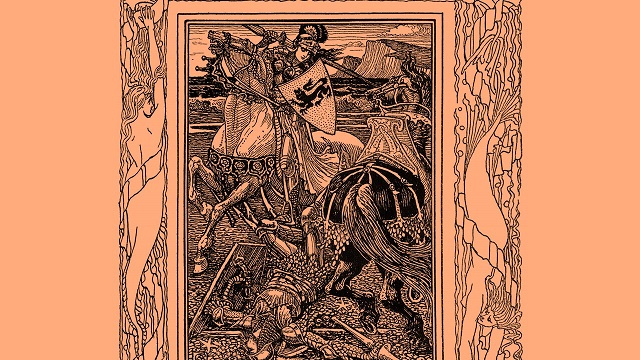.
Britomart and Marinell
In Edmund Spenser’s epic poem, The Faerie
Queene, Britomart is a female knight who
represents the virtue of chastity. Marinell is a
knight whose mother has prophesied that he will
only be conquered by a woman—romantically,
he presumes.
When Britomart takes on Sir Marinell,
The waves are sparkling, sand is flying from
Her charger’s hooves; she’s cherishing the smell
Of briny wind, forgetting whence she’s come
In light of her heart’s goal. Sir Marinell,
Who guards the strand and lets no other pass,
Espying her approach, her glittering mail,
Rides hard to meet the helm-disguiséd lass.
Convinced no knight can best him in a fight,
Assured by sea-nymph mother’s prophecy
A damsel will be his downfall—his sight
Is dimmed to rushing femininity.
The quick-converging hooves, the ready spears,
The clash of warrior arms by fate pre-planned—
And Marinell lies waylaid, stained by tears,
His bloody gore now blotching golden sand.
While Britomart unheeding hurries on,
Without a moment’s pause for fallen foe;
The ruin an opponent’s undergone
Not touching her, unmoved by other’s woe.
The one abased by over-confidence,
Presuming one can circumscribe one’s life;
The other brutal in her innocence,
Leaving a trail of incidental strife.
.
.
Jeremiah Johnson got his MA in Rhetoric in 2003 and then ran off to China to teach for a decade. His work has appeared in the Sequoyah and Ekphrastic Reviews. He is also currently a teacher of English Composition and World Literature at the University of North Georgia. He lives in Cumming, GA.















I very much enjoyed this poem, Jeremiah, which flows so smoothly, has a compelling narrative and a meaningful cautionary message regarding assumptions concerning destiny and the motives of others. Britomart is literally quite a heartbreaker. The phrase “brutal in her innocence” really sticks with me. Well done!
Hi Brian, Glad you enjoyed it! I found it interesting, in the opening to the 3rd book of FQ in which Spenser introduces Britomart, that he makes a complaint about how there aren’t more women warriors in literature and how he believes a woman can follow that line of work just as well as a man. The perspective felt surprisingly contemporary, what with Lara Croft and Wonder Woman leading a host of female action figures. On the other hand, Britomart DOES have a magic spear that makes her undefeatable in battle – so that she’s hardly playing fair!
Very entertaining, Jeremiah. Thanks for this well-done poem!
Glad you enjoyed it, Paul! Being entertaining is something I strive for, in the classroom as well as on the page 🙂
Britomart is the “Wonder Woman” of The Faery Queene — a testosterone-driven feminine dynamo. Since she also represents chastity, she takes on some of the characteristics of those two virgin goddesses, Athena and Artemis. They also could kick ass.
And there’s something vaguely “kick-ass” about chastity, I’ve always thought (though I’m a married man). Certainly Spenser wrote the whole work as a monument to the doughtiest of virgins!
Thanks for the note on Athena and Artemis – I’m going to have to give that more thought.
Very good work Jeremiah – I love seeing works based on or alluding to classics, and nowadays Spenser is massively underrated – if read at all. He was once considered our ‘Prince of Poets’ and anyone who has actually read The FQ would know why – the sheer poetical resourcefulness and imagination is astonishing. I like the contrast you draw in your concluding quatrain.
Thanks James! I’ve been working my way through the FQ for 5 months now and am on the home stretch. It constantly brings to mind other works of literature and film which I expect have drawn on it for inspiration (Star Wars, The Lord of the Rings, etc.), and I’ve gained an appreciation for everything it’s added to western culture – not to mention how great it is in its own right!
I like the colorful line here: “His bloody gore now blotching golden sand.” That sounds like something Spenser could have written. The poem is a quick picture of a rapid battle, and you have the action over and done with (commentary included) soon enough to describe it as “incidental strife.” Good choice of last words!
Margaret, Thanks for your incisive comments. You’ve got a knack for making others feel special by pointing out artistry where they aren’t even aware they’ve employed it.
With the “incidental strife,” in the back of my mind I was thinking of Daisy and Tom Buchanan and Nick’s commentary on them at the end of Gatsby – “They were careless people, Tom and Daisy. They smashed up things and people, and then retreated back into their money and their vast carelessness.” Originally, I had “careless in her innocence” instead of “brutal in her innocence” for the second to last line, until Evan pointed out that she’s just doing what knights do and that it’s not necessarily “careless.”
All that said, I hadn’t thought of those last two words as a commentary on the whole poem. Again, thank you for your thoughts!
I resonate with the woman warrior trope but this poem draws out the tragic aspect of it. The reader wishes it had been a love story after all. Maybe you did not intend a wistful edge of regret for the consequences of the over-encouragement of masculine tendencies in girls these days (?), but that is what I felt here.